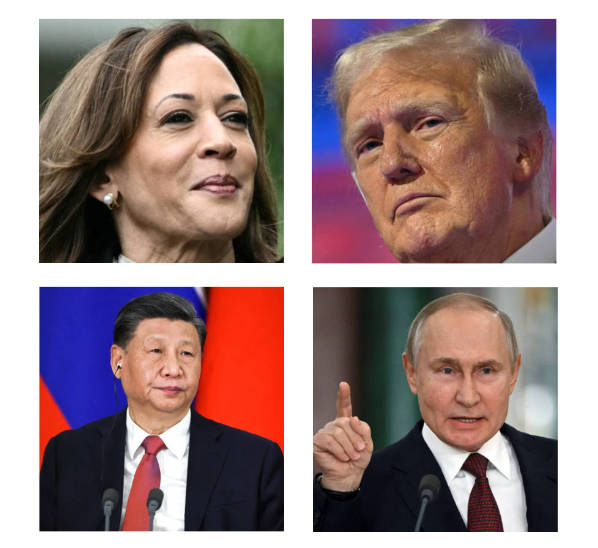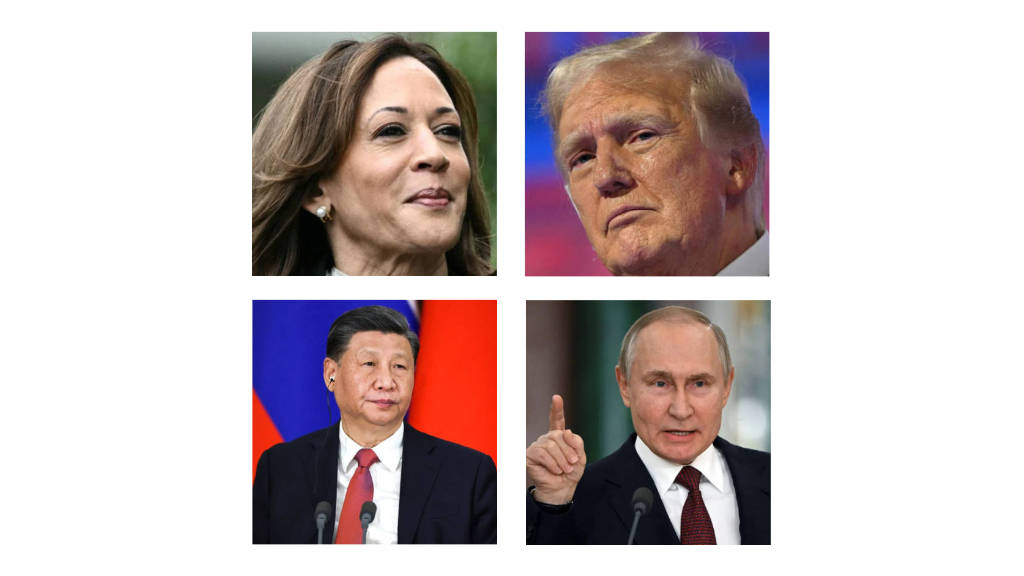
As everyone knows, the United States is currently holding its Presidential elections, with the voting population evenly split. No one seems able to make a prediction. Analysts are unable to analyse, some fearful of ‘getting it wrong’ – with political repercussions to follow – and therefore building in a closer contest in polls. National newspapers, also afraid of upsetting the winning candidate, have declined to endorse one or the other. Donald Trump has been shot at and subjected to at least one other assassination attempt. The sitting President is strongly suspected of being mentally below par, a sad sign of elderly decline. That begs the question: Who is really in charge? In this article, we examine how ‘rule of law’ and ‘democracy’ stack up in the United States as opposed to the same in Russia, China, and the BRICS.
As concerns, the US Presidential elections, held to elect arguably the world’s most powerful individual, the Presidential and would-be Presidential language has been childish:
Biden: “The only garbage I see hanging around are Trump voters”
Harris: Numerous ‘Word Salad’ statements such as “And understand the difference here, understand the difference here, moving forward, moving forward, understand the difference here…”
Trump: “Harris is a low IQ individual… dumb as a rock” and “Does Harris drink? Is she on drugs?”
The quality of what now passes for normal political, even diplomatic rhetoric has markedly declined in recent years. Alexey Mozhin, the Russian representative at the International Monetary Fund, which Russia also finances, has resigned after 30 years and had recently stated when collaborating with Western nations “They are rude to me… they insult my country. It’s all deeply disgusting.” Sergey Lavrov, Russia’s Foreign Minister, has also spoken out about this trend, saying that “Neither myself nor President Putin ever uses such language.” (Readers can Google to try and find examples). Lavrov also said that the Global South “are getting fed up with such (US) behaviour”.
The rather uncalled-for rhetoric aside, the interesting question is what will happen in the United States when the voting is done and dusted. With a race this close, it is entirely plausible that there could well be violence: the White House, a fortress of Western democracy, is currently being boarded up in case there are riots. There will almost certainly be legal challenges should the result be close, with both sides launching claims and counterclaims. These could run on into January.
It is even possible that the final winner is determined not by the millions of American people, but by just the 12 individuals sitting on the US Supreme Court. Yet they too, have previously been criticized for corruption and political bias. If overwhelming public anger at the election results – including a Supreme Court decision – becomes overwhelming, there could be serious social unrest in the entire country. And this is from a nation that has been promoting a ‘Rules-based International Order’.
We can compare this with what the West typically refers to as ‘Autocratic’ states run by ‘Dictators’. This too is insulting. But here we can look at both China and Russia. Like the United States, both modern versions of these countries were born out of revolution. Both are democratic, a statement that may surprise some readers. Agreed, the level of democratic institutions within both may differ from the West’s definition, but growing indicators are closer than often thought. After all, who is really is running the United States at this moment? That is now more difficult to determine than either China (Xi Jinping) or Russia (Putin).
In China, there are democratic elections. These may be based within the context of just one political party, bound by certain intellectually defended beliefs, but claiming China is autocratic is incorrect. In fact, power in China flows both up, and down. Villages and towns vote for representation at the Chinese National People’s Congress (NPC), which with 2,977 members, is the largest legislative body in the world. Naturally, there are different ideological factions and differing opinions. The Chinese one-party state is an effective way to combine both Democratic and Republican elements. In the United States, these different factions have become combative rather than cooperative.
In China, under one broad political umbrella, points related to governing the country are actively debated and sent further up the Chinese political structure and researched and further debated. Local and regional decisions are made at the executive branch level and are referred back down for implementation. Those of national importance are sent to the relevant Ministry for further analysis and debate. Eventually, the critical decisions and strategies as required are discussed by the Chinese Politburo, headed up by Xi Jinping. That is a body of 24 individuals (double that of the US Supreme Court) who make final decisions. It is a democratic process. Xi Jinping’s role is as Chairman, and he may hold the ‘reins of power’ but is still bound by the democratic processes beneath him. China is in fact, more democratic than autocratic. It is precisely to avoid splitting the country along political fault lines – as is now happening in the United States – and bearing in mind China had endured a civil war when it adopted this political structure – that it has such a democratic system, albeit with Chinese characteristics.
It is a similar situation in Russia, where having a population of 20% of China’s voting population instead extends directly to all Russian individuals in terms of appointing local, regional, and national legislative candidates, as well as the President. Russia’s political system and decision-making process evolves around the State Duma (Parliament) which has a collective 450 members. Required decisions are taken, then passed either back down the democratic structure to local and regional levels for implementation, or up the structure to Ministerial levels for further input. Eventually, the President issues a decree and signs this into law. Putin is no more an autocrat than Xi.
The important point here is understanding what ‘democracy’ really is. It isn’t necessarily the ‘one man, one vote’ simplification, as many are excluded. The young, the infirm, the criminal, the diaspora. National demographics also differ: For every US national, China has 5 Chinese nationals. Russia is geographically double the size of the United States. China and Russia have different but similar problems in reaching out to people. China has too many, and Russia is too remote. However, they have both reached democratic solutions that suit them. They have both embraced the democratic concept.
This is why they both – and this was very apparent at the recent BRICS Heads of State summit in Kazan – have stated that they want to see a ‘multipolar, new world order’ introduced, under the democratic institutions of the United Nations. The BRICS specifically stated that they “Expressed their support for comprehensive reform of the United Nations, including its Security Council, to make it more democratic, representative, and effective.” The document can be viewed here. (see articles 6, 8, and 21 among many other democratic references). That is a definitive commitment to both democracy and the rule of law.
This is in stark contrast to the political rhetoric coming out of the United States, where both candidates have accused each other of ‘destroying democracy’ and there is no mention, from either about the United States’ role in upholding the rules or regulations laid down in the UN Charter, which the US signed in 1945. Putin and Xi have shown they are serious about their international commitments. Neither Harris, nor Trump, have done the same.
There have been no mention of any ‘rule of law’ as concerns the US position in its foreign affairs, while meanwhile there appears to be an internal rule of law, democratic breakdown happening as well – getting gun laws repealed is just one example.
What the next few days, weeks, and even months will tell us – regardless of who wins and loses the US Presidential elections – is exactly what is meant by the United States’ perception of ‘democracy’, ‘rule of law’, what this actually means to Americans, and how serious the electorate are in both understanding and implementing it. It is becoming obvious that the United States’ democratic and rule of law systems have declined to become incapable of stability, and possibly, intellectual reason. A democratically divided nation is a dangerous state to be in.
Further Reading
What Will Happen With Russia If Donald Trump Is Elected As US President?

 Русский
Русский













